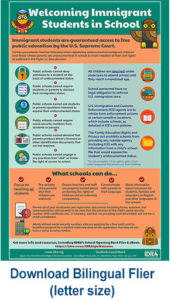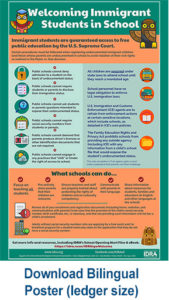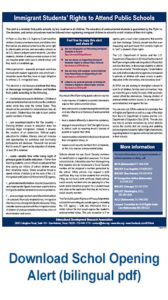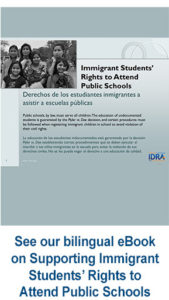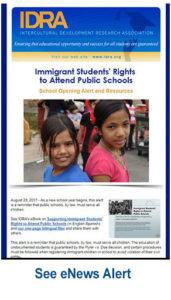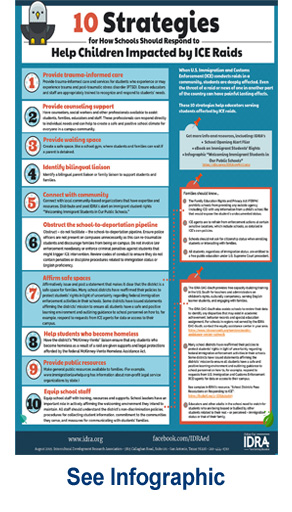Immigrant Students’ Rights to Attend Public Schools
Public schools, by law, must serve all children. The education of undocumented students is guaranteed by the Plyler v. Doe Supreme Court decision, and certain procedures must be followed when registering im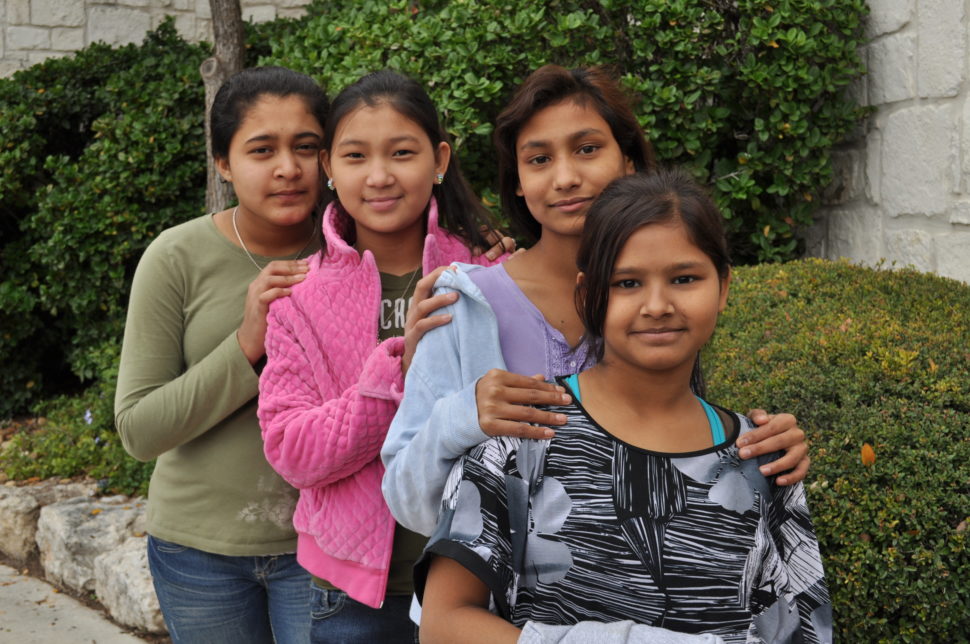 migrant children in school to avoid violation of their civil rights.
migrant children in school to avoid violation of their civil rights.
As a result of the U.S. Supreme Court ruling in Plyler vs. Doe, public schools may not:
- deny admission to a student during initial enrollment or at any other time on the basis of undocumented status;
- treat a student differently to determine residency;
- engage in any practices to “chill” the right of access to school;
- require students or parents to disclose or document their immigration status;
- make inquiries of students or parents intended to expose their undocumented status; or
- require Social Security numbers from all students, as this may expose undocumented status.
See our latest annual email alert in English and Spanish.
See our webpage dedicated to the Plyler v. Doe ruling.
Listen & Watch: The Law in Education – Plyler v Doe: Podcast Episode 224 and YouTube Video
IDRA Resources & Tools


Other Resources & Tools
Addressing “Ecological Shock” – Supporting Refugee Students in School, by Kristin Grayson, Ph.D., and Hannah Sung
Schools’ Duty to Educate English Learner Immigrant and Migrant Students, by Kristin Grayson, Ph.D.
See the letter from the U.S. Department of Justice and the U.S. Department of Education (May 2014) advising school officials that activities that deny or discourage students to attend school are unlawful. Plus the U.S. Department of Justice provides factsheets and Q&A reference documents.
Colorín Colorado’s website: Serving and Supporting Immigrant Students: Information for Schools
The Texas Education Agency issued official guidance in a 2017 letter (most recent letter).
Educational Services for Immigrant Children and Those Recently Arrived to the United States, U.S. Department of Education guidance, resources and frequently asked questions
Legal Issues for School Districts Related to the Education of Undocumented Children, National School Boards Association & NEA, 2009
Immigrant and Refugee Children – A Guide for Educators and School Support Staff with tools and resources to help protect and prepare youth and families in case of an Immigration and Customs Enforcement (ICE) raid. AFT has partnered with the National Immigration Law Center, United We Dream, and First Focus to develop this resource guide for educators and school support staff.
IDRA’s Classnotes Podcast episode on Immigrant Children’s Rights to Attend Public Schools.
See IDRA’s eBook for more details and many resources.
The following education resources are targeted to elementary and secondary school-aged students and their families. These and many more are in our eBook.
Plyler vs. Doe – Joint guidance letter from the U.S. Departments of Education and Justice describing the obligations of states and school districts under federal law to provide all children — regardless of immigration status — with equal access to public education at the elementary and secondary levels. The letter also is available in Spanish. Guidance is available in Spanish, Chinese, Arabic, Korean, Tagalog, and Vietnamese.
A Plyler vs. Doe fact sheet containing information on the rights of all children to enroll in school. The fact sheet is also available in Spanish.
Question and Answer Document for states, school districts, and parents; also available in Spanish.
New Immigrant Guide – Guidance from the U.S. Citizenship and Immigration Services provides basic information for new immigrants, including information about education, childcare, and schools, available in 14 languages.
English Language Learner Resources – This website contains resources for English language learners. Federal laws prohibit denial of equal access to education because of a student’s limited proficiency in English. States and school districts must provide English learner students with language assistance services so that they can meaningfully participate in education programs. Additionally, states and school districts must ensure that they effectively communicate to limited English proficient parents and caretakers the information that is provided to English-speaking parents. Information on equal access to a high-quality education is also available in Spanish.
Questions and Answers about Education Records – Schools maintain education records about students who are or were enrolled in the school. Education records can be used when students apply for college or entry into other types of education programs such as career training programs, as well as when students request DACA. This Question and Answer document provides answers to frequently asked questions about education records, including types of records, what they contain, how to locate them, and how to request them.
Migrant Education Program (MEP) – This website provides an overview of MEP. MEP funds support high-quality education programs for migratory children and ensure migratory children who move between states are not penalized for disparities in curriculum, graduation requirements, academic achievement standards, or academic content.
High School Equivalency Program (HEP) – This website provides an overview of HEP, a program designed to help migrant and seasonal farm workers and members of their immediate families obtain the equivalent of a high school diploma and to gain employment or begin postsecondary education or training.
White House Initiative on Education Excellence for Hispanics (WHIEEH) – This webpage provides an overview of WHIEEH, including its purpose, objectives, contact information, and relevant links. The WHIEEH aims to increase the education outcomes for Hispanic students, from cradle-to-career. WHIEEH is also on Facebook and Twitter.
White House Initiative on Asian Americans and Pacific Islanders (AAPI) – This webpage provides an overview of the AAPI initiative, including facts and data, resources, and contact information.
Article: Equity Access and Excellence in Education for Immigrant Students, by Abelardo Villarreal, Ph.D., and Rosana G. Rodríguez, Ph.D., IDRA Newsletter, February 2008
Article: Creative Collaboratives: Empowering Immigrant Students and Families Through Education, by Josie Danini Supik, M.A., and Albert Cortez, Ph.D., IDRA Newsletter, May 1996

